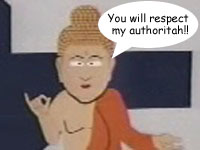The Buddha Dogma
Do not believe in anything (simply) because you have heard it.Gautama Buddha, Kalama Sutta
Do not believe in traditions because they have been handed down for many generations.
Do not believe in anything because it is spoken and rumoured by many.
Do not believe in anything (simply) because it is found written in your religious books.
Do not believe in anything merely on the authority of your teachers and elders.
But after observation and analysis when you find that anything agrees with reason and is conductive to the good and benefit of one and all then accept it and live up to it.
This was never intended to be a 'Zen blog', but that's the way it seems to be going at the moment so I'll just go with it. I don't claim to be an expert on Zen or Buddhism - these are just my personal views, which might change in the future and which you're free to ignore. I'm not even formally ordained.
My aim is always to practice zen with my eyes and mind open as it were, since there seems to be a human tendency towards religiosity, ideology and dogma - a tendency to become partial and to develop rigid ideas, to conform and engage in 'group-think'. Why shouldn't that apply to Zen? The last thing I want to do is become another religious nut. Sometimes I think I see Zen practitioners seemingly getting very attached to the trappings of Zen and I wonder if that's helpful. I try to just be my ordinary self and to assume as little as possible about Zen. I don't assume that Soto Zen is always the best way. For example, sitting in the lotus position works well for me, although I do get 'pins and needles' in one foot after a while and if I'm sitting for a long time I get tense, painful shoulders. Perhaps I'm doing it wrong. Perhaps there are better ways of doing zazen. There's no reason to imagine that there's anything magical about the posture - anything that allows us to remain motionless, alert and quiet for a long time without too much tension or pain fits the bill. For all I know Mike Cross and Pierre Turlur might be right - maybe the Alexander Technique is better. I don't know, I've never tried it.
One criticism that gets levelled at Zen quite a bit is that it does not emphasise direct cultivation of compassion. The justification I've heard for this is that trying to act compassionate or cultivate compassion when it isn't sincere is artificial and hence a distortion of our true selves. We cannot force ourselves to act and feel compassionate. I think there is some truth in this. I have met Buddhists that have the same sort of forced over-sincerity and over-niceness that many Christians seem to have. To try to do this seems to be a recipe for repression and self-deception and that can't be healthy. This is borne out by my own earliest experiences with Buddhism.
I originally came across Mahayana Buddhism some years ago as an undergraduate. I was very intrigued by the philosophy and seemed to get some benefit from meditation practice, but I had reservations about it: I found nothing to make me accept the notion that we will be reborn when we die, it all seemed like wishful thinking and not very well thought out and I wasn't keen on all that devotion to Boddhisatvas and so on. I'm a healthily sceptical and logical person, and I'd spent far too long debating with Christian apologists to accept such ideas on faith.
Some of the practice seemed insincere - I felt I was trying to make myself be nice and compassionate and serene, when in fact deep down I usually felt quite different. Was it because I was a beginner? Was I being badly taught? Or was it inherent in the teaching? It was as if I was meant to sprinkle sugar on top of all the 'negative' but real feelings I had and as such seemed to be encouraging me to regard my true feelings as unacceptable and thus repress them and replace them with something more 'wholesome' but less sincere.
The Zen approach is careful self-observation through the practice of Zazen so that the attachments of the 'personal self' are eroded away leaving a nature which is selfless and naturally compassionate.
It's an interesting theory, and it certainly seems likely to avoid artifice, but I don't know to what extent it would cultivate compassion. Without a personal self is our nature really more compassionate? There are enough stories of abuse by American 'Zen Masters', support for Japanese pre-war imperialism by Japanese roshi and use of Zen by samurai as a tool of violence to give me some doubts about that. It's for this reason that I supplement my Zazen with Metta Bhavana meditation. In the context of self-awareness and an attitude of acceptance I really think it is possible to cultivate compassion without the problems I described above.
The reason that I practice Soto Zen is mainly because it is light on metaphysical, philosophical and supernatural speculation. There are no Boddhisatvas to pray to or magical sutras to chant for good karma. For obvious reasons you do need to have confidence in the practice, but that's about it. The practice is very down-to-earth, 'stripped down' and simple. Its not about believing or disbelieving, it's about paying attention to the actuual reality of here and now. Being a natural sceptic, that suits me fine. Of course, to practice Soto Zen formally you have to do it in a certain way. You have to follow the Noble Eightfold Path and try your best to live according to the Buddhist precepts. Practice involves certain rituals, if you are ordained you should wear a rakusu, a kesa etc when you're at the zendo. Beyond that it doesn't really matter what you think (if anything) about the afterlife or karma etc.
Another thing I try to remain agnostic about is the nature of Enlightenment. I think its important not to idealise it or pin hopes on it. To me, 'Enlightenment' is just being fully present with perhaps a gradual loss of illusions over time.
Now, these provisional personal views are all part of a process of personal investigation, not dissimilar to scientific investigation, although exploring subjective areas which are difficult for science to access. Nevertheless, there are a number of scientific studies which provide compelling evidence for many claims made about Buddhist practice.
This empirical approach is also encouraged in the Kalama Sutta (quoted above), not that I needed Buddha to give me permission not to take him as an absolute authority, but it's just as well that this sutta exists since the tendency to religiosity an to represent Buddha as an omniscient god-like figure is strong in Buddhism. Those words at least give independent-mindedness a fighting chance.
Some Buddhists use the Right View/Right Understanding principle of the Eightfold Path as a club to hit free-thinkers over the head with. I don't have beliefs in rebirth after death or karma (as traditionally described) and am accused sometimes of not being a 'real Buddhist'. Apart from the fact that I don't care whether these people consider me a real Buddhist or not (in a sense its a relief if they don't) as far as I'm concerned rebirth and karma are merely the philosophical backdrop against which Buddha had his realisations. He did not originate these concepts - they were standard Vedic beliefs, which most people in India at that time accepted without much questioning. All Buddha did was modify the concept of reincarnation to rebirth to attempt accomodate his principle of anatta - the absence of inherent self. He also did not refute the existence of gods, although he described them as limited beings, subject to birth and death like everyone else and discouraged reliance upon them.
To suppose that Buddha was omniscient is an extraordinary claim for which there is no evidence. It's not even something that he claimed about himself. How could he possibly have known what happens before and after people die. Modern, well-educated, rational people who are scientifically literate may realise that visions or apparent memories about such matters do not constitute good evidence any more than they provide good evidence of Satanic child abuse or the existence of spirits or elves or extraterrestrials. Buddha did not have the benefits of a 21st century education. And for me at least, the notion of rebirth after death is rendered redundant by moment-to-moment rebirth ie. a realisation of no inherent self.
As far as I'm concerned, Buddha's key and original insights were interdependence/emptiness and causes of suffering and the method of liberation from it. It is an understanding of these principles which constitutes Right Understanding.
And what, monks, is right understanding? Knowledge with regard to sadness, knowledge with regard to the origination of sadness, knowledge with regard to the stopping of sadness, knowledge with regard to the way of practice leading to the stopping of sadness: This, monks, is called right understanding.Magga-vibhanga Sutta, An Analysis of the Path
An author I can really recommend on the topic of agnostic Buddhism is Stephen Batchelor especially his book Buddhism Without Beliefs.
Now, before anyone misunderstands me, I'm not suggesting that Buddhism is whatever you want it to be. It has a good breadth of interpretation, from the most rational and science-friendly to the most religious. There are sects which insist on belief in karma and rebirth and sects for which such metaphysical speculation is redundant. But there comes a point where it will stop being Buddhism and start being something else.
You can read more about the Kalama Sutra here: http://en.wikipedia.org/wiki/Kalama_Sutra





dude u shld read some chinese spiritual literature..goes deeper i think than jap..or mebe theyre same sources but i dont knw much ..
ReplyDeleteThis comment has been removed by a blog administrator.
ReplyDeleteVery interesting post. Thanks so much for sharing. I think you've found another regular reader.
ReplyDelete